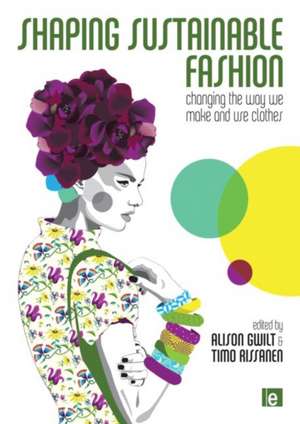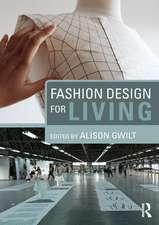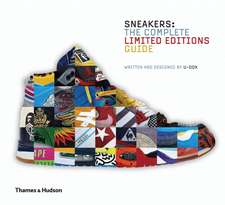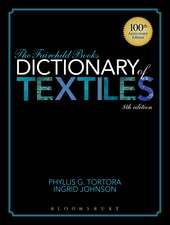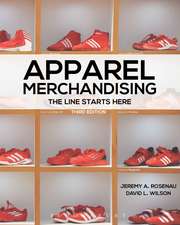Shaping Sustainable Fashion: Changing the Way We Make and Use Clothes
Editat de Alison Gwilt, Timo Rissanenen Limba Engleză Paperback – 27 ian 2011
Based on the results of extensive research into lifecycle approaches to sustainable fashion, the book is divided into four sections:
- source: explores the motivations for the selection of materials for fashion garments and suggests that garments can be made from materials that also assist in the management of textile waste
- make: discusses the differing approaches to the design and manufacture of sustainable fashion garments that can also provide the opportunity for waste control and minimization
- use: explores schemes that encourage the consumer to engage in slow fashion consumption
- last: examines alternative solutions to the predictable fate of most garments – landfill.
| Toate formatele și edițiile | Preț | Express |
|---|---|---|
| Paperback (1) | 270.61 lei 6-8 săpt. | |
| Taylor & Francis – 27 ian 2011 | 270.61 lei 6-8 săpt. | |
| Hardback (1) | 991.17 lei 6-8 săpt. | |
| Taylor & Francis – 9 feb 2011 | 991.17 lei 6-8 săpt. |
Preț: 270.61 lei
Preț vechi: 325.50 lei
-17% Nou
Puncte Express: 406
Preț estimativ în valută:
51.80€ • 56.28$ • 43.54£
51.80€ • 56.28$ • 43.54£
Carte tipărită la comandă
Livrare economică 21 aprilie-05 mai
Preluare comenzi: 021 569.72.76
Specificații
ISBN-13: 9781849712422
ISBN-10: 1849712425
Pagini: 192
Ilustrații: Colour photographs, colour maps, colour diagrams
Dimensiuni: 170 x 240 x 12 mm
Greutate: 0.36 kg
Ediția:New.
Editura: Taylor & Francis
Colecția Routledge
Locul publicării:Oxford, United Kingdom
ISBN-10: 1849712425
Pagini: 192
Ilustrații: Colour photographs, colour maps, colour diagrams
Dimensiuni: 170 x 240 x 12 mm
Greutate: 0.36 kg
Ediția:New.
Editura: Taylor & Francis
Colecția Routledge
Locul publicării:Oxford, United Kingdom
Cuprins
Lists of Figures, Tables and Images. Acknowledgements. Foreword – The Environmental Trust, New South Wales Government. Introduction from the Editors Part 1: Source Introduction 1.1. Remediation: Discussing Fashion Textiles Sustainability 1.2. Case Study: Upcycling Materials for Fashion 1.3. Case Study: New Materials for Fashion 1.4. Sustainable Textiles – Nature or Nurture? Part 2: Make Introduction 2.1. Producing Sustainable Fashion: The Points for Positive Intervention by the Fashion Designer 2.2. Case Study: The Tailor's Craft 2.3. Case Study: The Perfect Solution 2.4. Zero-waste Garment Design: Strategies and Risk-taking for Design Practice Part 3: Use Introduction 3.1. Sustainable Clothing Care by Design 3.2. Case Study – Slowing Fashion 3.3. Case Study – Personalising Fashion 3.4. Designing Endurance Part 4: Last Introduction 4.1. Textile Recycling Options: Exploring What Could Be 4.2. Case Study: Reuse in the Fashion Cycle 4.3. Case Study: A New Future Fashion Industry 4.4. Post-growth Fashion and the Craft of Users. Case Study Profiles. Resources. Editors' Biographies
Notă biografică
Alison Gwilt is the Course Director for Fashion & Textile Design at the University of Technology Sydney, Australia and is a fashion design academic and researcher who has been exploring sustainable solutions and strategies for fashion and textile design through her practice-based research activities and PhD studies. She has more than 18 years experience in academia managing and lecturing in fashion and textiles design in the UK, New Zealand and Australia. Timo Rissanen is the Assistant Professor of Fashion Design and Sustainability at Parsons The New School for Design in New York. His fashion design practice is informed by inquisitive patternmaking and broad sustainability concerns.
Recenzii
'Alison Gwilt and Timo Rissanen [are] zero-waste pioneers.'New York Times'An authoritative new book ... [that] provides an eloquent description of the scale of the problem, both in terms of the environmental impact of the fashion industry and the myriad ways in which the current industry is stacked against sustainable practice.'DAMn Magazine'This book is an invaluable reference for anyone serious about designing fashion and textiles for sustainability. From designers empowered through knowledge and motivated by applying traditional skills in new ways, to the everyday practical wisdoms of the wearers' 'craft of use', Shaping Sustainable Fashion outlines how sustainability can help shape cultural attitudes and suggest new behaviours in everyone. This book helps us envision not only sustainable products, but also a sustainable culture and society.'Lynda Grose, Fashion Designer, Assistant professor, Fashion and Sustainability at California College of the Arts'Designers will play a critical role in reducing the fashion industry's negative impacts on the environment. Shaping Sustainable Fashion illustrates four meaningful and memorable areas to create sustainable solutions across a garment's lifecycle-Source, Make, Use, and Last.' Marsha Dickson, Professor of Fashion and Apparel Studies, University of Delaware'Through exploratory essays and case studies, this book brings a realistic and insightful perspective on many urgent concerns about the relationships of fashion, textiles and sustainability. Rissanen and Gwilt combine their professional and research findings astutely to present original and practical solutions to some of the major challenges facing fashion practices - present and future.'Hazel Clark, PhD, Dean, School of Art and Design History and Theory, Parsons the New School for Design, New York
Descriere
The production, use and eventual disposal of most clothing is environmentally damaging, and many fashion and textile designers are becoming keen to employ more sustainable strategies in their work. This book provides a practical guide to the ways in which designers are creating fashion with less waste and greater durability.
